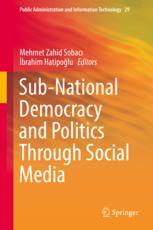

Most ebook files are in PDF format, so you can easily read them using various software such as Foxit Reader or directly on the Google Chrome browser.
Some ebook files are released by publishers in other formats such as .awz, .mobi, .epub, .fb2, etc. You may need to install specific software to read these formats on mobile/PC, such as Calibre.
Please read the tutorial at this link: https://ebookbell.com/faq
We offer FREE conversion to the popular formats you request; however, this may take some time. Therefore, right after payment, please email us, and we will try to provide the service as quickly as possible.
For some exceptional file formats or broken links (if any), please refrain from opening any disputes. Instead, email us first, and we will try to assist within a maximum of 6 hours.
EbookBell Team

0.0
0 reviewsThis book analyzes the impact of social media on democracy and politics at the sub-national level in developed and developing countries. Over the last decade or so, social media has transformed politics. Offering political actors opportunities to organize, mobilize, and connect with constituents, voters, and supporters, social media has become an important tool in global politics as well as a force for democracy. Most of the available research literature focuses on the impact of social media at the national level; this book fills that gap by analyzing the political uses of social media at the sub-national level.
The book is divided into two parts. Part One, “Social Media for Democracy” includes chapters that analyze potential contributions of social media tools to the realizing of basic values of democracy, such as public engagement, transparency, accountability, participation and collaboration at the sub-national level. Part Two, “Social Media in Politics” focuses on the use of social media tools by political actors in political processes and activities (online campaigns, protests etc.) at the local, regional and state government levels during election and non-election periods. Combining theoretical and empirical analysis, each chapter provides evaluations of overarching issues, questions, and problems as well as real-world experiences with social media, politics, and democracy in a diverse sample of municipalities. This volume will be of use to graduate students, academicians, and researchers, in several disciplines and fields, such as public administration, political science, ICT, sociology, communication studies and public policy as well as politicians and practitioners.